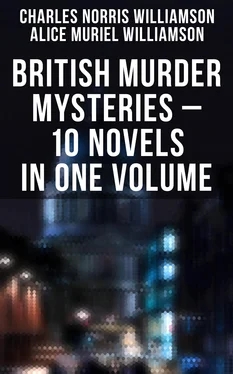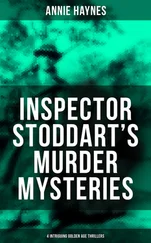At least, she had suffered, too, and so had Knight.
Could it be, she asked herself, that the watchers were somehow mixed up in the business? Were they members of the supposed gang? That did not seem likely, for how could a man like Knight have got involved with thieves? Yet it seemed, from what he had said that night at the Savoy—and never referred to again—as if he were somehow in their power.
How curiously like one of them Morello had been! She remembered thinking so, with a shock of fear. Then she had lost the feeling of resemblance, and told herself that she must have imagined it.
The two faces came back to her now, and again she saw them alike. She was glad that Knight had never invited Morello to call, and glad that when grudgingly she had asked one day after the two men who had witnessed their marriage, Knight had said, "Gone out of England. We just caught them in time."
As for the watchers, she had heard no more of them. Knight ignored the episode, or the part of it connected with those men. The memory of them was shut up in the locked box of his past, and he never left the key lying about, as apparently he had left the key of Mrs. Ellsworth's house.
Suddenly, while Annesley listened to Ruthven Smith, she became conscious that, as he talked to Lady Cartwright, his eyes had turned to her.
"This proves," the fancy ran through her head, "that if you look at or even think of people, you attract their attention."
She glanced away, and at her neighbours. They were both absorbed for the moment; she need not worry lest they should find her neglectful. She took some asparagus which was offered to her, and began to eat it; but she still had the impression that Ruthven Smith was looking at her. She wondered why.
"He can't be expecting me to scream at him across the table," she thought.
"Yes," he was saying to Lady Cartwright, "it was a misfortune to lose those pearls. Two I had selected to make a pair of earrings can scarcely be duplicated. But none of the things stolen from me compared in value to those our agent lost on board the Monarchic . I suppose you read of that affair?"
"Oh, yes," said Lady Cartwright, her voice raised in deference to her neighbour's deafness. "It was most interesting. Especially about the clairvoyant woman on board who saw a vision of the thief in her crystal, throwing things into the sea attached to a life-belt with a light on it, or something of the sort, to be picked up by a yacht. One would have supposed, with that information to go upon, the police might have recovered the jewels, but they didn't, and probably they never will now."
"I'm not sure the police pinned their faith to the clairvoyante's visions," replied Ruthven Smith, with his dry chuckle.
"Really? But I've understood—though the name wasn't mentioned then, I believe—that the woman was that wonderful Countess de Santiago we're so excited about. She is certainly extraordinary. Nobody seems to doubt her powers! I rather thought she might be here."
Ruthven Smith showed no interest in the Countess de Santiago. Once on the subject of jewels, it was difficult to shunt him off on another at short notice. Or possibly he had something to say which he particularly wished not to leave unsaid at that stage of the conversation.
"The newspapers did not publish a description of the jewels stolen on the Monarchic ," he went on, brushing the Countess de Santiago aside. "It was thought best at the time not to give the reporters a list. To me, that seemed a mistake. Who knows, for instance, through how many hands the Malindore diamond may have passed? If some honest person, recognizing it from a description in the papers, for instance——"
"The Malindore diamond!" exclaimed Lady Cartwright, forgetting politeness in her interest, and cutting short a sentence which began dully. "Isn't that the wonderful blue diamond that the British Museum refused to buy three years ago, because it hadn't enough money to spend, or something?"
"Quite so," replied Ruthven Smith, adding with pride: "But the Van Vrecks had enough money. They always have when a unique thing is for sale; and they are rich enough to wait for years, with their money locked up, till somebody comes along who wants the thing. That happened in the case of the Malindore diamond. The Van Vrecks hoped to sell it to Mr. Pierpont Morgan. But he died, and it was left on their hands till this last autumn."
"Ah, then that lovely blue diamond was sold with the other things the Van Vreck agent lost on the Monarchic ?"
" Was to be sold if the prospective buyer liked it. He had married a white wife, you know, and——"
"Oh, yes, of course. It was Lady Eve Cassenden. That marriage made a big sensation among us. Horrid , I call it! But she hadn't a penny, and they say he's the richest Maharajah in India."
"The Malindore diamond was once in his family, I understand, about five hundred years ago, when we first begin to get at its history," Ruthven Smith went on, ignoring the Maharajah as he had ignored the Countess de Santiago. "It was then the central jewel of a crown. But later, Louis XIV, on obtaining possession of it, had it set in a ring, and surrounded with small white brilliants. It still remains in that form, or did so remain until it was stolen from our agent on the Monarchic . What form it is in and where it is now, only those who know can say."
So strong was the call from Ruthven Smith's eyes to Annesley's eyes that she was forced to look up. She had been sure that she would meet his gaze fixed upon her, and so it was. He was staring across the table at her, with a curious expression on his long, hatchet face.
Chapter XVII.
Ruthven Smith's Eyeglasses
Table of Contents
Annesley could not read the look. Yet she felt that it might be read, if her soul and body had not been wrenched apart, and hastily flung together again, upside down, it seemed, with her brain where her heart had been, and vice versa.
Why had Ruthven Smith looked at her, as he spoke in his loud voice of the stolen Malindore diamond—a blue diamond set with small brilliants, in a ring? Had he found out that she—did he believe—but she could not finish the thought. It seemed as though the ring Knight had given her— and told her to hide —was burning her flesh!
Could her blue diamond be the famous diamond, about which the jewel expert was telling Lady Cartwright? A horrible sensation overcame the girl. She felt her blood growing cold, and oozing so sluggishly through her veins that she could count the drops—drip, drip, drip! She hoped that she had not turned ghastly pale. Above all things she hoped that she was not going to faint! If she did that, Ruthven Smith would think—what would he not think?
She found herself praying for strength and the power of self-control that she might reason with her own intelligence. Of course, if this were the diamond, Knight didn't dream that it had been stolen.
Just then a hand reached out at her left side and poured champagne into her glass. It was the hand of Charrington, the butler. Annesley saw that it was trembling. She had never seen Charrington's hand tremble before. Butlers' hands were not supposed to tremble. Charrington spilled a little champagne on the tablecloth, only a very little, no more than a drop or two, yet Annesley started and glanced up. The butler was moving away when she caught a glimpse of his face.
It was red, as usual, for his complexion and that of his younger brother were alike in colouring; but there was a look of strain on his features, as if he were keeping his muscles taut.
Sir Elmer Cartwright began to talk to her. His voice buzzed unmeaningly in her ears, as though she were coming out from under the influence of chloroform.
Читать дальше












